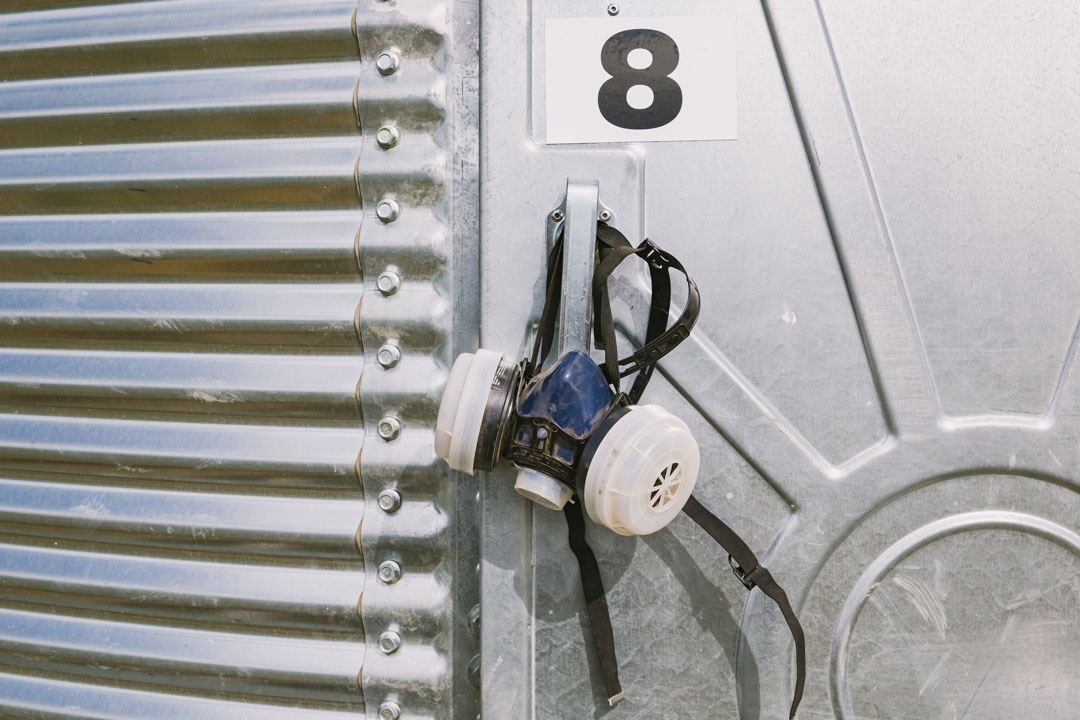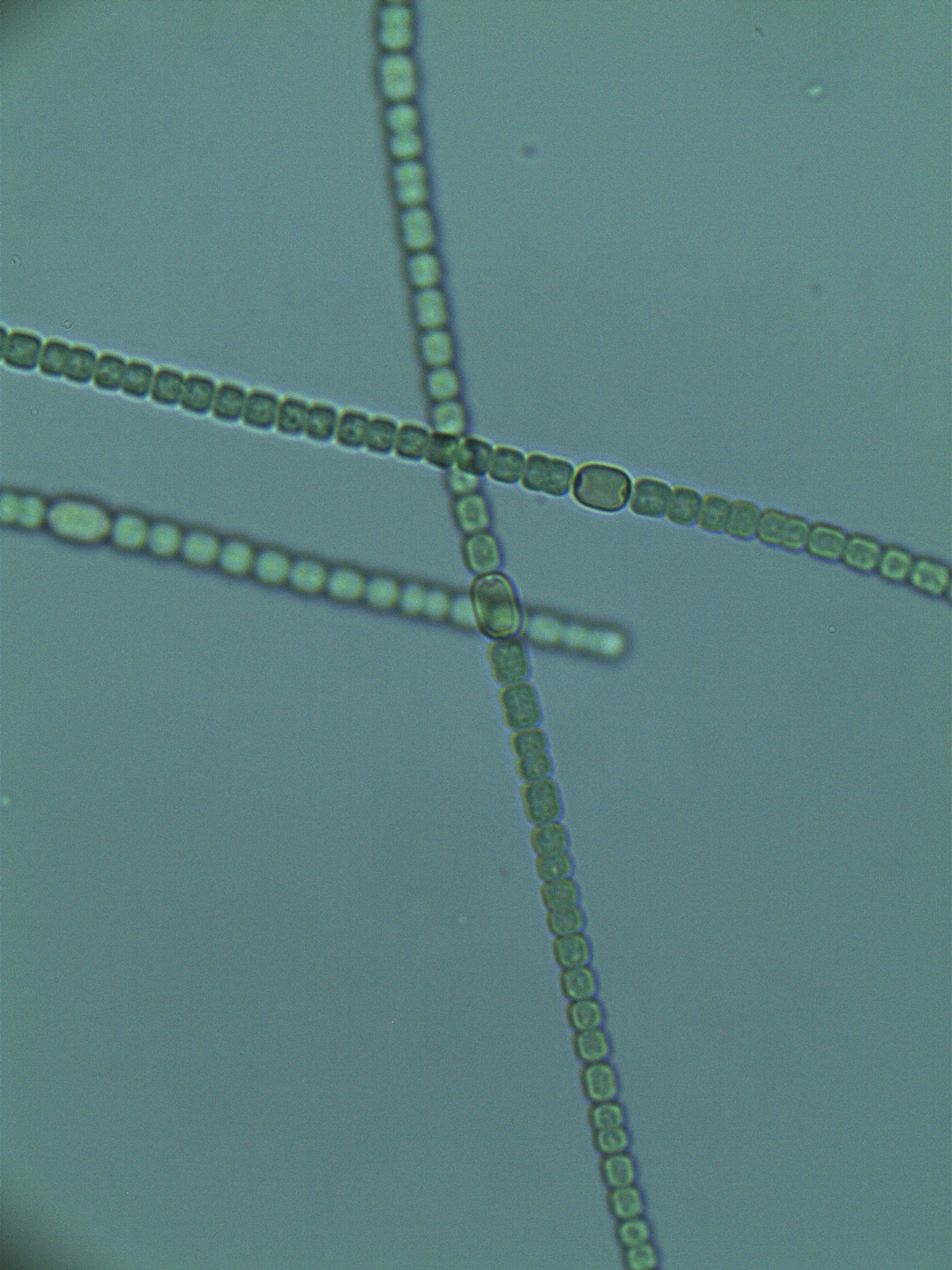PPE MIA
BY IAN DOIG • PHOTO BY TWO STONE PHOTOGRAPHY
Farmers require PPE for themselves and their employees during daily operation as well as to satisfy Occupational Health and Safety (OH&S) requirements where necessary. During the COVID-19 pandemic, the focus on the healthcare sector as well as a greater volume of use by the general public has created a shortage of personal protection equipment (PPE) in the agriculture sector.
The Alberta Wheat Commission (AWC) and Alberta Barley surveyed farmers early in the pandemic to determine which gear is most needed. Top priority items identified are disposable gloves, N95 respirator masks, face shields and non-N95 certified masks. Shannon Sereda, government relations and policy manager for the commissions, said the survey also determined that farmers aren’t using PPE for COVID-related concerns, but for day-to-day operations and crop-related activities.
Protection from hantavirus is a big concern, as are residuals from inputs such as fertilizer, feed and crop protection products. Grain dust is also a central concern, with OH&S regulations requiring employees to wear N95 masks when exposed to it.
“I think the need and the demand was underestimated for agriculture, so some of our main ag retailers weren’t stocking anything at all,” said Sereda. “They had some of their supply seconded to the healthcare sector. Of course, they gave it up as a priority, but then it left farmers at a shortfall and really unable to access what they needed for their regular operations.”
“I think the need and the demand was underestimated for agriculture.” —Shannon Sereda
The Government of Alberta created an online ordering system for PPE, but farmers have not found it an effective means of acquiring this gear. “The problem is the system is not specific to agriculture,” said Sereda. Given the two commissions alone represent approximately 14,000 farmers, this has created a high volume of individual farm orders for gear such as masks and gloves. Because the system restricts purchases to a two-week supply, the amount of PPE being requested can be limited. Such small orders are subsequently given low priority behind bulk orders.
Sereda suspects farmers in the north are seeing the most pressing PPE shortage. Christi Friesen is an AWC region five representative who farms wheat, peas, canola and malt barley near Brownvale in Peace Country. Friesen’s farm requires N95 and other masks as well as nitrile gloves and a small number of face shields. As she prepared for seeding and the farm’s hired hand was to begin shovelling out bins, she submitted an order on the provincial PPE request system on May 4. The following day, the system informed her that her request was 9,439th in the queue. As of June 2, her request for masks and gloves was designated as “on hold” by the system’s order tracker.
“I legitimately need masks,” said Friesen. “I can’t have anybody around treated seed when we’re filling the drill. We need to have masks on.” Though she has enough gloves on hand for immediate use, she was unable to find masks at farm equipment stores in her area. She has borrowed just enough to get by.
“That’s what I’ve been hearing, is that it’s been tough to find and it’s almost like the toilet paper thing—people are hoarding them,” —Christi Friesen
Friesen said other farmers in her region are having similar difficulty finding PPE. Many have some on hand while others continue to search, and available masks are often of low quality. “That’s what I’ve been hearing, is that it’s been tough to find and it’s almost like the toilet paper thing—people are hoarding them,” she said.
In southern Alberta near Enchant, seed grower Greg Stamp reports his operation happened to be well stocked with PPE prior to the outbreak of COVID-19. To handle immediate needs, he has enough rubber gloves, chemical masks with charcoal filters for chemical mixing as well as N95 masks for grain shovelling.
“I think it will be a problem, because we’re now competing with the general public.” —Greg Stamp
“We’re probably going to run low, and come harvest time, we’re going to need more,” he said. Others in his region have resorted to borrowing from neighbours, and Stamp is concerned PPE will remain difficult to find. “I think it will be a problem, because we’re now competing with the general public.” Farmers and their employees may also use portions of their PPE supply for non-farm uses such as attending community events and church services or going shopping, he said.
Some demand for personal use may now be satisfied by a government initiative scheduled to launch in early June. A total of 20 million free non-surgical masks in packages of four will be made available to the general public at restaurant drive-thus across Alberta.
Stamp said he may have to use the provincial PPE ordering system and that its scheduled July 1 closure to non-critical sectors such as agriculture may be problematic. “Combine clean-out starts the end of July and we sometimes start ramping up with harvest into the start of August. It always comes sooner than you think, and then right now, we’re starting to clean bins. I have guys cleaning bins right now, so we’re starting to burn through that stuff.”
Friesen is also concerned about her ongoing ability to locate PPE and the closure of the provincial ordering system to the farm sector. “That is actually terrifying. I am quite nervous about that. More populated areas of the province might have better access to things than up here in the Peace.”
“However, we do not always have all items in stock. When this is the case, we strive to order and obtain supplies as quickly as possible.” —Alberta Agriculture and Forestry
While order fulfilment via Alberta’s online request system has been criticized, Alberta Agriculture and Forestry (AF) recognizes that sectors such as agriculture have always needed their own PPE supply, it has emphasizing the government’s commitment to making good on requests for this gear. The AF communications department informed GrainsWest in a written statement that the department does its best to fulfill requests within two weeks. “However, we do not always have all items in stock. When this is the case, we strive to order and obtain supplies as quickly as possible.”
The department also emphasized that the PPE supply chain is improving in general as more manufacturers develop these products, giving Alberta businesses more options from which to make purchases. If emergency short-term need emerges, such as a threat to food security, the government will consider providing PPE to organizations not on its distribution list. It now provides information at the Alberta Biz Connect web page to assist businesses and organizations in locating supplies.
In an effort to make PPE available to farmers, UFA recently announced it will be carrying Chinese KN95 masks at its Farm and Ranch Supply Store locations. These are a near equivalent to the N95. Customers can purchase 10 masks for $3.40 each for the foreseeable future. On April 20, the company had donated 4,800 N95 masks for use by Alberta Health Services front-line workers.
In the province’s seed processing plants, OH&S rules mainly demand the use of masks for respiratory dust protection and steel-toe footwear in certain instances. The facilities also require PPE for the handling of pesticides. This includes eye protection, nitrile gloves, and respiratory protection equipment for dust and fumes.
“I would forecast the situation post July 1 will only get worse. This is a huge concern,” —Monica Klaas
On May 28, Monica Klaas, Alberta Seed Processors general manager, told GrainsWest the organization’s members have not consistently been able to locate needed equipment during the pandemic. This has been particularly true of N95 masks, the most commonly used PPE in processing plants. The association placed a bulk order for N95 or other suitable masks with the provincial ordering system, but most of the masks they received were deemed unusable. Some were used by staff in plant offices, but much of the order was returned. Klaas said some seed plants have managed to purchase small quantities of N95 masks at inflated prices.
“I would forecast the situation post July 1 will only get worse. This is a huge concern,” she said. “We are in the process of finishing up our busy season, but then maintenance and exposure to dust continues or is even elevated.”
Klaas added Alberta Seed Processors is very interested in cooperating with other ag-industry organizations to make an industry-wide push for adequate PPE supply. “We can only imagine that governments are very busy with COVID-19 issues at large, and having many different groups contact them separately, [requests] may get lost in the shuffle.”







Comments